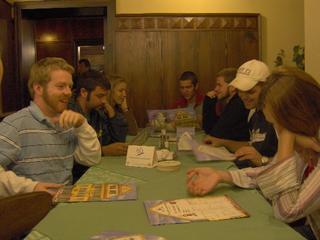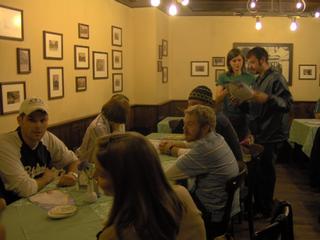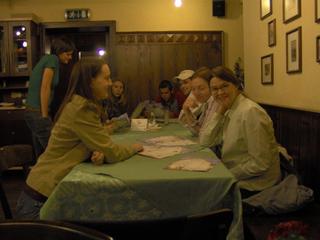Stammtisch--for the regulars
 Tonight was the first of what promises to be a regular Tuesday night gathering. We now have a stammtisch (a table reserved for regular patrons) at Kneitinger Brauerei. Until now most of the gang only knew stammtisch (if they knew it at all) as a term used to describe a weekly gathering organized by well-meaning language teachers to encourage speaking German in a social setting.
Tonight was the first of what promises to be a regular Tuesday night gathering. We now have a stammtisch (a table reserved for regular patrons) at Kneitinger Brauerei. Until now most of the gang only knew stammtisch (if they knew it at all) as a term used to describe a weekly gathering organized by well-meaning language teachers to encourage speaking German in a social setting.In fact the stammtich is one of the most important German social institutions. At these reserved tables groups of like-minded regulars came together to talk politics, literature, music, hunting and fishing--any number of things that might form the basis voluntary association (Verein). For good and ill these beerhall Vereine were central to German cultural and political development.
 Stammtich clubs contributed to the spread of the Enlightment in Germany and to German liberal and republican sentiments, leading to the failed Revolutions of 1848 that sent thousands of Germans (including my father's family) to America seeking political asylum. There they founded German towns (like Fulda, Ohio), brewed great beer, and became ardent supporters of the Union in the Civil War.
Stammtich clubs contributed to the spread of the Enlightment in Germany and to German liberal and republican sentiments, leading to the failed Revolutions of 1848 that sent thousands of Germans (including my father's family) to America seeking political asylum. There they founded German towns (like Fulda, Ohio), brewed great beer, and became ardent supporters of the Union in the Civil War. 
Like most social institutions, however, (including the FORCE) the stammtich has a darkside.
Thus Hitler launced his failed 1923 rebellion, the infamous (and comic) Beerhall Putsch from the Nazi stammtich at the Munich Bürgerbräu Keller.
But I think it safe to say that our stammtisch will not turn to the darkside--except when we order ein Dunkels mit sechs, Kraut, and Brot. 

0 Comments:
Post a Comment
<< Home